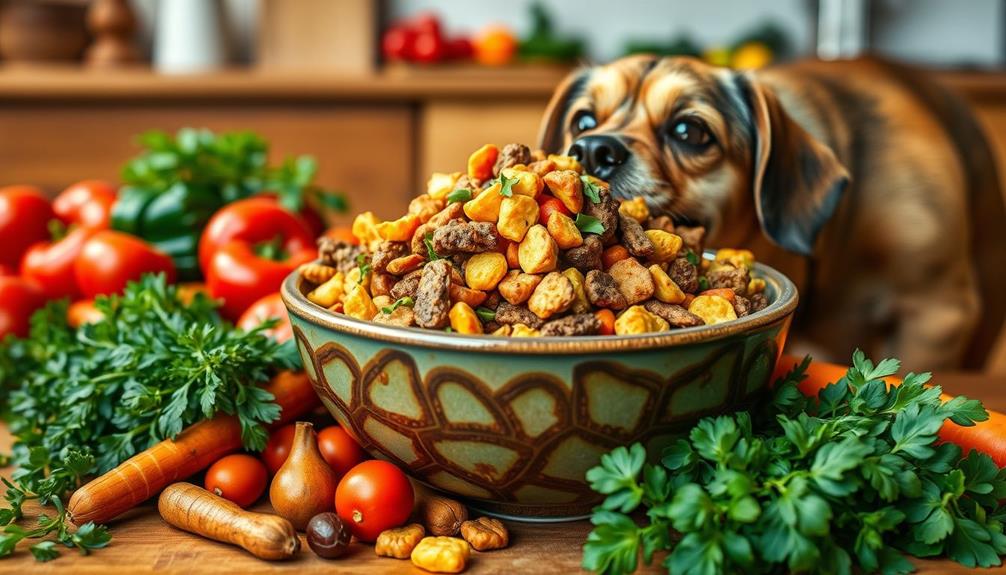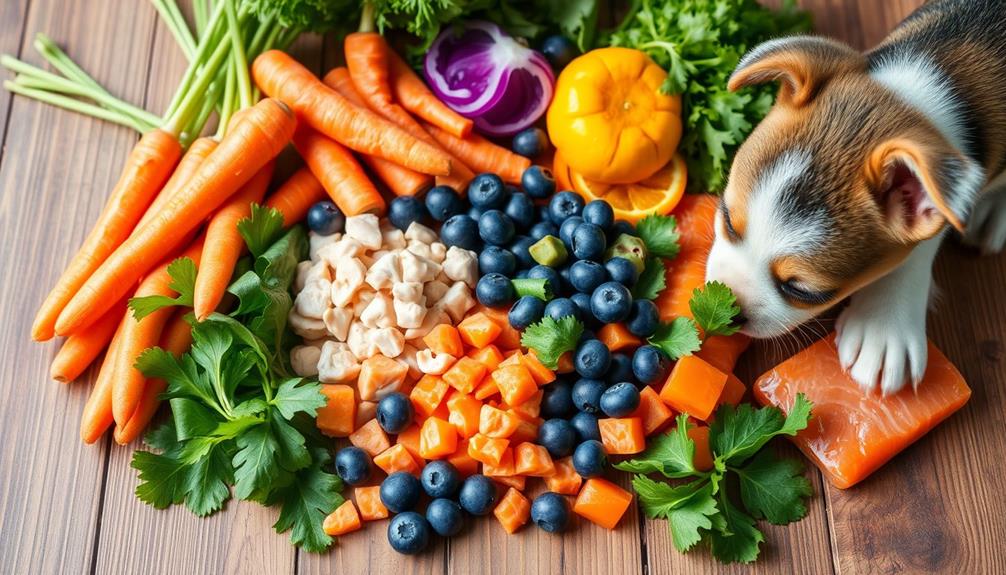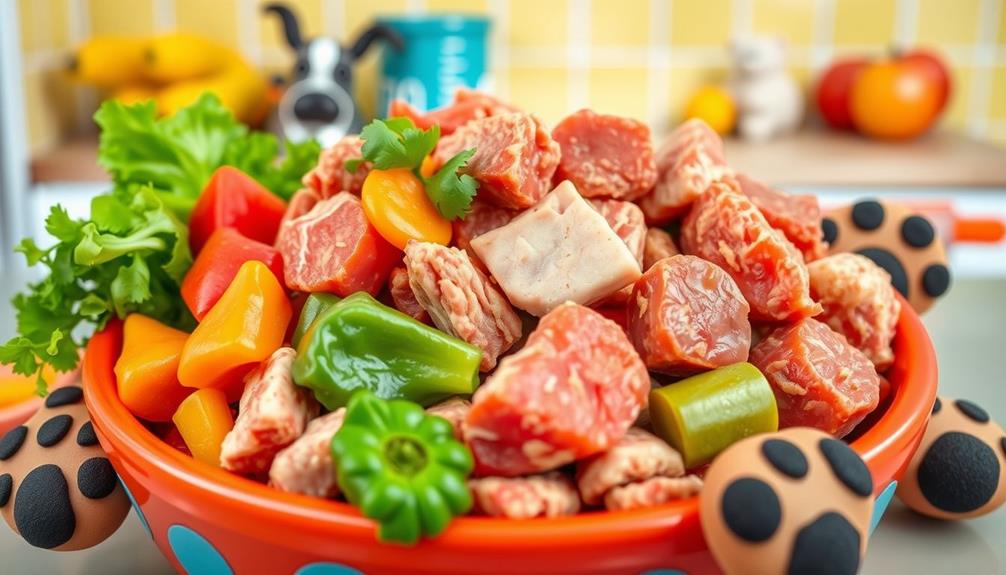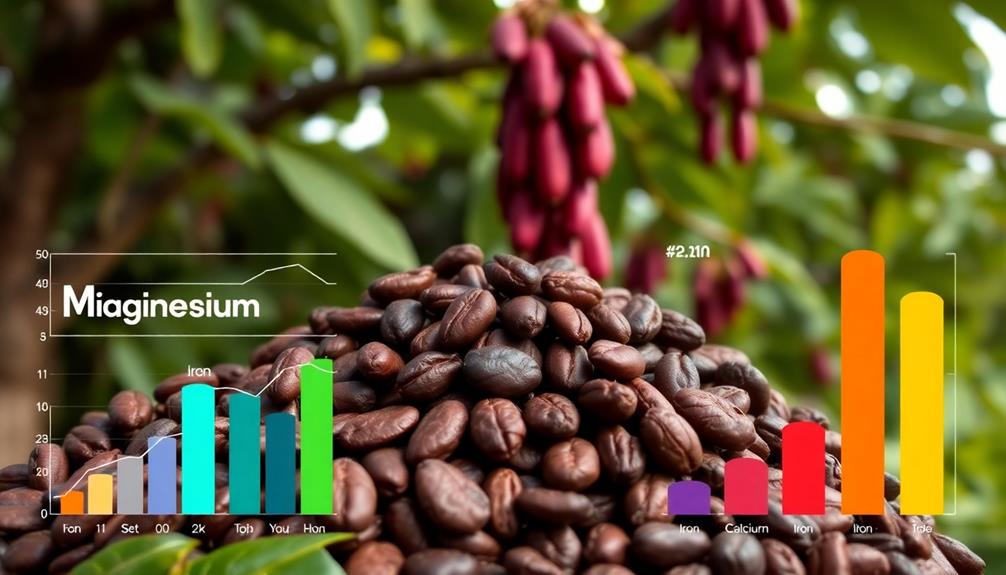Raw food diets for puppies can offer benefits like improved digestion, shinier coats, and better energy levels. However, these diets also come with risks such as the potential for harmful bacteria, nutritional imbalances, and choking hazards from whole bones. Puppies have specific nutritional needs that a raw diet might not always meet, which could lead to deficiencies or health issues. Before you decide, it's essential to consult with a veterinarian to weigh these pros and cons carefully. If you want to understand the various options and expert recommendations on puppy diets, you might find some intriguing insights ahead. When considering raw food for puppies, it’s important to do thorough research and consider all the potential implications. It’s crucial to ensure that any raw food diet is well-balanced and safe for your puppy’s specific needs. Additionally, discussing the decision with a veterinarian can provide valuable guidance and ensure that you are making the best choice for your puppy’s health and well-being.
Key Takeaways
- Raw diets can improve digestion, skin health, and energy levels in puppies, contributing to overall wellness.
- Nutritional balance is vital; raw diets must meet specific protein, fat, and mineral requirements to support healthy growth.
- Risks include pathogenic bacteria, nutritional deficiencies, and choking hazards from bones, which can lead to serious health issues.
- Veterinary professionals advise caution with raw diets due to potential contamination and imbalances that can affect puppy health.
- Alternatives like commercial pet foods or home-cooked diets can provide balanced nutrition without the risks associated with raw feeding.
Benefits of Raw Diets for Puppies
A raw diet can offer numerous benefits for your puppy, making it an appealing option for many pet owners. One standout advantage is improved digestion. Studies show that raw diets enhance digestive function compared to traditional kibble, leading to healthier gut health for your puppy.
You might also notice that your puppy develops healthier skin and a shinier coat, thanks to the high-quality proteins and fatty acids found in raw foods. In addition, incorporating natural ingredients in your puppy's diet can contribute to their overall health and wellness, ensuring they grow strong and vibrant. Moreover, providing healthy dog snacks can complement their raw diet, keeping them engaged and satisfied.
Another significant benefit is the boost in energy levels. Puppies thrive on nutrient-dense foods, which can support their growth and activity levels, making them more playful and lively.
Additionally, raw diets can promote better dental health. Chewing on raw bones helps reduce plaque and tartar buildup, resulting in fresher breath for your furry friend.
If your puppy suffers from allergy symptoms, a raw diet may help alleviate some issues. By allowing you to control the ingredients, you can minimize exposure to common allergens, leading to a healthier, happier pup.
Nutritional Needs for Puppy Growth

Puppies' nutritional needs are essential for their growth and development, requiring a careful balance of fundamental nutrients. To support ideal puppy growth, you'll need to guarantee their diet is rich in protein, ideally around 22-32% depending on their age and breed. Proper nutrition is crucial to prevent health issues later in life, as seen in ultimate hamster care where balanced diets are emphasized for small pets.
Protein is critical for cell regeneration and overall development. Fats are equally important, providing concentrated energy and supporting brain development, with a recommended fat content of 8-20%.
Carbohydrates should also play a significant role, making up about 30-40% of their diet to fuel their active lifestyle. Additionally, adequate vitamins and minerals are vital for immune function and bone health. Pay particular attention to the calcium and phosphorus ratios, especially for large breed puppies, to prevent bone deformities.
As your puppy grows, their nutritional needs will evolve, so it's important to adjust their diet accordingly. A balanced diet will guarantee they receive the right nutrients throughout their developmental stages.
If you're considering a raw food diet, keep in mind that it must still meet these fundamental requirements to support your puppy's health and growth effectively.
Risks of Raw Diets

Many pet owners are drawn to raw diets for their puppies, believing it offers a more natural approach to nutrition. However, there are significant health risks associated with raw diets. One major concern is the presence of pathogenic bacteria; studies show that up to 80% of raw pet food may contain Salmonella, which can affect both puppies and humans.
Additionally, improperly balanced homemade raw diets can lead to nutritional deficiencies, risking severe health issues as your puppy grows. It's vital to understand the importance of selecting the right cold medication for your pet's health, just as you'd for yourself. You should also be cautious of choking hazards posed by whole bones in raw diets, which can cause dental fractures or internal injuries if they splinter.
Moreover, high-protein raw diets could result in bone deformities due to improper calcium-phosphorus ratios, essential for your puppy's skeletal development. Abruptly switching to raw diets can cause gastrointestinal upset, including vomiting and diarrhea.
To minimize these risks, it's important to shift gradually and seek veterinary guidance. By being aware of these potential dangers, you can make informed decisions about your puppy's diet and overall health.
Alternatives to Raw Feeding

While raw feeding might seem appealing, there are several viable alternatives that can provide balanced nutrition for your puppy.
Commercial pet foods, such as kibble and canned options, are formulated to meet the nutritional needs of growing puppies and adhere to regulations set by organizations like the Pet Food Industry Association. These diets guarantee your puppy receives essential nutrients without the risks associated with raw.
Additionally, it's important to take into account the potential benefits of a structured budget for pet care, as managing expenses can help you afford quality food options that support your puppy's health.
If you prefer more control over ingredients, contemplate home-cooked diets. They allow you to tailor meals to your puppy's specific nutritional requirements, but they require a solid understanding of canine nutrition to maintain nutritional balance.
For puppies with grain allergies, grain-free diets can be beneficial, using alternative carbohydrates like sweet potatoes or lentils. However, it's vital to confirm these diets are well-balanced to prevent deficiencies.
Hybrid diets combine commercial food with raw or home-cooked options, offering variety while requiring careful attention to nutritional balance.
Finally, specially formulated veterinary diets cater to puppies with specific health issues, providing tailored nutrition that may not be achievable through homemade or raw diets.
Each of these alternatives can serve as a safer, balanced option for your puppy's diet.
Expert Recommendations on Diet Choices
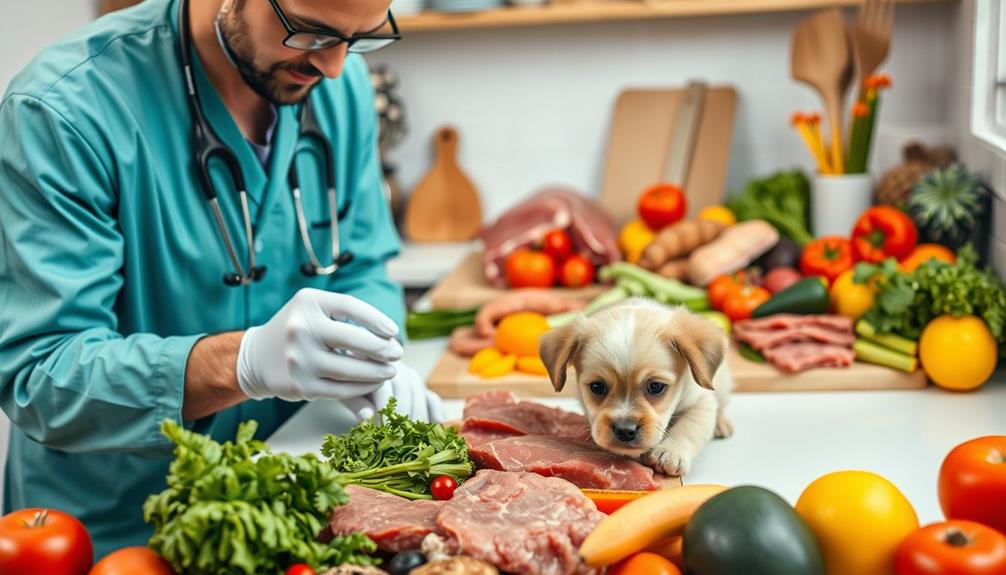
When considering your puppy's diet, expert guidance is essential. Shifting to a raw diet might seem appealing, but it's vital to consult veterinary advice first. Puppies have unique nutritional needs that vary by age, breed, and health conditions.
The American Veterinary Medical Association cautions against raw diets due to potential nutritional imbalances and bacterial contamination. Additionally, it's important to be aware that just like humans, pets can be affected by certain foods; for example, raw foods can pose health risks, not just for puppies but also for their human caregivers due to food-borne illnesses, as seen in some cases with certain dietary choices.
If you decide to pursue a raw diet, make sure it's a balanced raw option that meets all essential nutrient requirements. Homemade raw diets often lack significant vitamins and minerals necessary for your puppy's growth.
Experts strongly recommend monitoring your puppy's response to any dietary changes, especially when introducing raw foods. Keeping an eye on their health can help you identify any adverse reactions or issues that arise.
Frequently Asked Questions
Is a Raw Food Diet Good for Puppies?
A raw food diet can offer benefits like improved digestion and energy levels for your puppy, but it also carries risks such as bacterial contamination and nutritional imbalances. Always consult a vet before making changes.
Why Don't Vets Recommend a Raw Diet?
Vets don't recommend raw diets because of the high risk of bacterial contamination and nutritional imbalances. They emphasize the importance of balanced, commercially prepared foods that guarantee your dog's health and safety.
What Are the Disadvantages of Raw Food for Dogs?
Isn't it surprising how raw food can pose serious risks? You'll find potential bacterial infections, nutritional imbalances, choking hazards, and costly preparation issues. Plus, sudden diet changes might lead to your puppy's gastrointestinal distress.
Is It Better to Feed Puppies Raw or Cooked Meat?
When deciding between raw or cooked meat for your puppy, consider their individual health needs. Cooked meat can reduce bacterial risks, while raw may offer higher nutrients. Consulting a vet guarantees you make the best choice.
Conclusion
In the end, choosing between raw and traditional diets for your puppy is like steering a winding road; both paths offer unique experiences and potential pitfalls. While a raw diet can provide essential nutrients that support growth, it also carries risks that can affect your pup's health. Think carefully about your choices, much like a gardener tending to their plants—balance is key. Consult with your vet to find the best route for your furry friend's journey to a healthy life.


